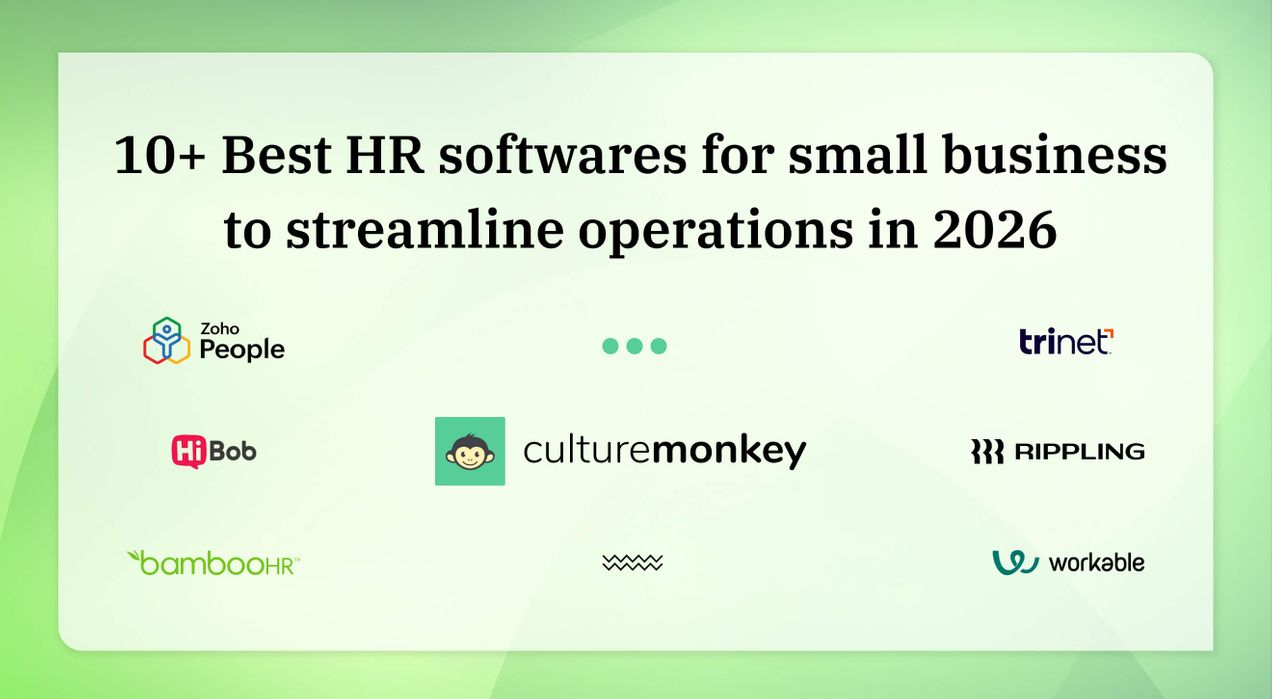25+ Best HRIS systems for small businesses to simplify HR in 2025

Your office manager just called in sick, the new hire can’t log into the payroll system, and someone handed you a crumpled sticky note that says “Jim’s last day = Friday?” Sound familiar? Welcome to HR chaos, small business edition. When you're wearing 17 hats and still expected to handle HR processes like a Fortune 500 company, it’s easy to feel like you’re always one step behind.
That’s exactly why HRIS systems for small businesses have become the unsung heroes of modern teams. These smart tools tackle everything from time and attendance tracking to performance management, freeing up your HR team to focus on what really matters—like not crying over Excel sheets.
But not all HR management software is created equal. To help you skip the trial-and-error phase, we’ve rounded up the 25 best HRIS systems for small businesses in 2025—each one built to make your HR tasks such as time and attendance tracking, payroll management etc. easier, faster, and way less frustrating.
What is an HRIS system?

An HRIS system, or Human Resource Information System, is a digital solution or an HR system designed to manage, organize, and streamline core HR processes by centralizing employee data and automating key HR functions. It supports tasks like payroll processing, benefits administration, time tracking, employee onboarding, and performance management in a unified platform.
At its core, an HRIS system is a HR system that eliminates the need for manual spreadsheets and scattered paperwork. It empowers HR professionals with tools for time and attendance tracking, employee data management, payroll management, compliance management, and workforce planning—all from one centralized location. For small businesses, this means fewer errors, reduced administrative burden, and more time spent on strategy rather than repetitive HR tasks.
Modern HRIS systems come with powerful features such as attendance tracking, reporting and analytics, employee self service portals, and automated workflows. These functionalities help small business HR teams streamline HR processes, stay on top of regulatory changes, and ensure compliance effortlessly.
For companies juggling multiple HR functions with limited resources, investing in the best HRIS system is more than just a tech upgrade—it’s a game-changer. Whether you're looking for a small business HRIS, HRIS for startups, or HRIS systems for small companies, the right and best HRIS system can significantly improve your overall human capital management approach.
And with a user friendly interface, even non-tech-savvy teams can easily manage employee records, benefits management, and payroll and benefits administration without missing a beat.
Why small businesses need an HRIS (not just enterprises)

It’s a myth that only big corporations need powerful HR tools. In reality, HRIS systems for small businesses are often more impactful because small teams have fewer hands managing a wide range of HR tasks. With limited time, tighter budgets, and growing compliance requirements, small business owners and HR professionals need smart systems that can handle complexity without creating chaos.
Here’s why small businesses should stop thinking of HRIS as a “nice-to-have” and start treating it like a must-have:
- Centralized employee data: Instead of juggling spreadsheets, folders, and sticky notes, HRIS systems organize all your employee records, employee information, and HR data in one secure place—making retrieval, updates, and audits incredibly simple. This is especially useful when multiple people need access to up-to-date employee data.
- Streamlined HR processes: Small businesses often lack dedicated departments for every HR function. An HRIS system helps automate HR tasks like leave approvals, employee onboarding, and performance management, giving your HR team breathing room to focus on growth.
- Efficient payroll processing: Many small businesses struggle with accurate, timely payroll processing. The right payroll software or integrated payroll system within an HRIS handles calculations, tax deductions, and payroll and benefits with minimal human error.
- Improved compliance management: Small companies are just as bound by labor laws as large ones. Compliance management tools built into HRIS platforms help you ensure compliance with local, state, and federal regulations, reducing legal risk and penalties.
- Better employee engagement: Features like employee self service, employee self service portal, and employee engagement tools empower your workforce and boost employee satisfaction, creating a stronger company culture from the ground up.
- Cost-effective HR and payroll management: Rather than outsourcing to a professional employer organization, a small business HRIS software gives you full control over HR and payroll, payroll systems, and compensation management—at a fraction of the cost.
Key functions of HRIS systems for small businesses
HRIS systems for small businesses aren’t just fancy databases—they're full-fledged platforms built to simplify complex HR processes, reduce administrative tasks, and keep everything from payroll processing to compliance management running smoothly.
They empower HR professionals to manage operations with more accuracy, speed, and efficiency—without growing the headcount. These systems combine essential HR functions into one user-friendly interface tailored for lean, agile teams.
Here are the key functions every small business should look for in an HRIS:
- Employee data management: A reliable HRIS system centralizes employee information including contact details, job titles, documents, and employment history. This reduces redundancy, streamlines audits, and improves visibility across the organization.
- Time and attendance tracking: With built-in time tracking and attendance tracking, businesses can monitor shifts, hours worked, and leave balances with minimal effort. This ensures accurate payroll and avoids issues like buddy punching or missed overtime.
- Payroll management and processing payroll: An effective HRIS simplifies payroll processing and payroll management by automating calculations, deductions, and tax filings. This reduces manual errors and ensures employees are paid accurately and on time.
- Benefits administration: Managing employee benefits—from health insurance to health savings accounts—is easier when all benefits administration tasks are handled within the HRIS. It also supports benefits management and helps track enrollment, eligibility, and renewals.
- Performance management: HRIS systems provide structured tools for performance reviews, goal setting, and continuous improvement. This helps strengthen workforce planning and aligns talent management efforts with broader business goals.
- Compliance management: Built-in compliance management ensures small businesses can follow labor laws, track certifications, and manage documentation. This reduces legal risks and supports long-term HR management goals.
- Employee self service: Through a user friendly interface, employees can access payslips, update records, and request time off via an employee self service portal, reducing the burden on the HR team and improving employee engagement.
Top benefits of using an HRIS for small businesses
By consolidating vital HR functions and automating repetitive HR tasks, an HRIS delivers efficiency, accuracy, and transparency. It’s not just about saving time—it’s about elevating how HR professionals manage people, processes, and strategy.
Here’s how a small business HRIS delivers measurable value:
- Reduced administrative burden: HR teams in small businesses juggle multiple responsibilities. HRIS systems take over repetitive administrative tasks like document handling, data entry, and scheduling, giving HR professionals time to focus on high-value initiatives like employee engagement and company culture. For organizations that lack capacity to manage these administrative workflows in-house, partnering with a virtual administrative assistant is a strategic solution to handle tasks, keeping operations agile and HR teams focused on impact.
- Improved workforce management: With accurate data on time tracking, attendance tracking, and performance management, small businesses can make informed decisions about scheduling, hiring, and workforce planning. This keeps the business agile and better prepared for growth.
- Cost savings on HR and payroll: By combining payroll software with other HR software functions, businesses reduce their dependency on external services or multiple tools. This means less money spent on standalone payroll systems or HR services and more accurate payroll and benefits administration.
- Enhanced employee experience: Features like employee self service and a user friendly interface empower employees to access their employee information, view benefits, and update records without depending on HR. This autonomy directly impacts employee satisfaction and retention.
- Stronger compliance management: With built-in compliance management tools and real-time alerts, HRIS systems help ensure compliance with regulations—minimizing legal risk and keeping your business audit-ready at all times.
- Data-driven decisions: Reporting and analytics tools give insight into trends in compensation management, benefits administration, and HR operations. Small businesses can finally approach HR management with confidence, supported by data and not guesswork.
Common HR challenges small businesses face without an HRIS
Without HRIS systems for small businesses in place, managing HR tasks manually becomes a full-time job filled with inefficiencies, compliance risks, and mounting frustration for both HR professionals and employees. The absence of automation creates bottlenecks in almost every area of HR and payroll management.
Here are the most common challenges small businesses encounter without a proper HRIS:
- Disorganized employee data: Without a centralized human resource information system, employee records and employee information are often scattered across spreadsheets, emails, or even paper files. This fragmentation makes HR data difficult to access, update, and secure, which slows down decision-making and increases the risk of errors.
- Payroll processing errors: Relying on manual processes or outdated payroll systems leads to missed payments, incorrect tax deductions, and delayed filings. These payroll processing issues impact employee trust and can result in penalties, especially when processing payroll for growing teams.
- Limited reporting and analytics: Without proper reporting features or analytics and reporting tools, it’s hard to gain insights into HR operations. Small businesses miss opportunities to improve performance management, workforce planning, and compensation management simply because they lack visibility.
- Weak compliance management: Navigating changing labor laws manually is risky. Without built-in compliance management tools, small businesses struggle to ensure compliance, which can lead to audits, fines, or lawsuits—especially in the absence of reliable payroll and benefits administration.
- Low employee engagement: Without access to employee self service options or a user friendly interface, employees are left waiting on HR for every minor update. This reduces employee engagement and creates dissatisfaction over time, especially when employee benefits and onboarding processes feel clunky.
- Inefficient HR functions: From attendance tracking to learning management, managing HR tasks manually slows down everything. Without a modern HR software solution, small businesses face constant delays that affect overall productivity and morale.
Signs your small business has outgrown manual HR processes

At first, tracking PTO on a spreadsheet or handling payroll with a calculator might feel manageable. But as your team grows and HR responsibilities pile up, these manual methods quickly become roadblocks.
Many small businesses don’t realize they’ve outgrown their old ways until they’re buried under HR tasks and compliance issues. Recognizing the signs early can help you transition to HRIS systems for small businesses before things start slipping through the cracks.
Here are clear indicators that your small business is ready for a modern HRIS:
- Payroll always feels like a fire drill: If your payroll processing takes hours—or even days—and you're double-checking every number manually, it's a sign you’ve outgrown basic tools. A dedicated payroll management system within an HRIS can automate everything from deductions to tax filing and make processing payroll less painful.
- Employee data is all over the place: When employee records, contracts, and benefits details are stored in different formats across different platforms, managing HR data becomes chaotic. A human resource information system ensures centralized employee data, making updates and access fast and secure.
- Your HR team is stuck in admin mode: If your HR team spends most of its time on repetitive tasks like tracking leave, updating spreadsheets, or emailing onboarding docs, it’s time to automate. The best HRIS system supports automated workflows, learning management, and performance management to help them focus on strategy.
- Compliance feels like guesswork: If you’re not 100% confident about compliance management, labor law updates, or benefits administration deadlines, it's time to switch. Built-in compliance management tools help ensure compliance, saving you from costly errors.
- Employee engagement is starting to dip: Lack of employee self service, outdated HR software, or confusing onboarding experiences impact employee engagement. An intuitive, user friendly interface and streamlined HR functions lead to better communication, satisfaction, and retention.
Key features to look for in small business HRIS solutions
The best HRIS system for small business should support your team’s growth, reduce administrative tasks, and make HR and payroll management seamless from day one.
Here are the essential features every small business should prioritize:
- User friendly interface: A complicated system defeats the purpose. Look for an HRIS that’s intuitive and easy to navigate, allowing both HR professionals and employees to use features like employee self service without constant training or IT support.
- Time tracking and attendance tracking: Built-in time tracking and attendance tracking allow businesses to accurately monitor employee hours, manage shifts, and prevent time theft. This ensures smooth payroll processing and workforce planning.
- Payroll and benefits administration: A good HRIS should integrate payroll management, benefits administration, and compensation management. It should also handle processing payroll, generate pay stubs, and manage payroll and benefits all in one place.
- Performance management tools: From tracking goals to managing reviews, robust performance management capabilities help align employee performance with company objectives. These tools also support learning management and long-term talent management strategies.
- Compliance management features: Look for systems with built-in compliance management tools that ensure compliance with tax laws, labor regulations, and benefits reporting. This is crucial for reducing risk and supporting smooth core HR operations.
- Comprehensive reporting and analytics: Your HRIS should offer advanced reporting features and analytics and reporting tools to track trends in employee engagement, turnover, and compensation. This helps drive continuous improvement in HR management and strategic decision-making.
25+ Best HRIS systems for small companies

Choosing the right HRIS system can completely transform how small businesses handle HR processes. From automating payroll processing to managing employee onboarding and performance management, the best HRIS system is one that simplifies your life and scales with your team. Below are 25 top-rated HRIS systems for small businesses, packed with features that support everything from compliance management to employee engagement.
1. BambooHR
BambooHR is a leading name among HRIS systems for small businesses. Known for its sleek, user friendly interface and intuitive tools, it supports everything from performance management to employee self service. It centralizes employee records, simplifies benefits administration, and offers reporting and analytics features perfect for small business HRIS needs. It's especially effective at streamlining complex HR processes.
2. Rippling
Rippling is an all-in-one HRIS software that combines HR, IT, and finance in a single platform. It automates payroll processing, compliance management, and benefits administration. With strong features for time tracking, employee data management, and learning management, Rippling is ideal for small businesses wanting to reduce administrative burden without sacrificing power or flexibility.
3. Paycor
Paycor offers a robust HRIS for startups and small businesses. Its comprehensive suite includes payroll and benefits administration, performance management, and employee onboarding. What makes Paycor stand out is its deep focus on reporting and analytics, making it easier for HR professionals to track progress and workforce planning metrics in real time.
4. factoHR
factoHR is a powerful all-in-one HRMS software built for growing organizations. It brings together core HR, attendance, leave, performance, and payroll into a single, easy-to-use platform. Its automated payroll ensures statutory compliance across PF, ESIC, TDS, and PT, while integrated leave and time tracking stay perfectly aligned with payroll. With a mobile-first ESS portal, real-time analytics, and strong data security, factoHR simplifies everyday HR operations for both teams and employees.
5. Gusto
Gusto shines as both a payroll software and small business HRIS. With a focus on HR and payroll management, it includes payroll processing, employee benefits, and employee self service. Its compliance management tools help small businesses ensure compliance without the stress. Gusto’s delightful, user friendly interface makes it a hit for managing HR tasks.
6. HiBob
HiBob delivers a modern HRIS system with a strong focus on human resource management and employee engagement. It helps small businesses align compensation management with performance management and supports benefits management seamlessly. Its advanced reporting features and attendance tracking tools empower HR teams to make smarter decisions faster.
7. Paylocity
Paylocity is a powerful solution for medium sized businesses and small businesses alike. It handles everything from payroll and benefits administration to time tracking and employee self service. Paylocity’s learning management and workforce planning tools help ensure continuous improvement across all HR functions. It’s also known for its strong compliance management tools.
8. ADP
ADP is a giant in the HR world but still offers tailored solutions for HRIS systems for small businesses. It supports payroll and benefits, compliance management, and performance management. With an easy-to-use employee self service portal and scalable options, ADP is great for businesses planning to grow.
9. Paychex
Paychex provides a full suite of HR software tools for small businesses, including payroll management, benefits administration, HR and payroll integration and many more features needed for human resource management. With its employee engagement features and strong reporting and analytics capabilities, it simplifies managing HR and reduces the strain on your HR team.
10. Paycom
Paycom offers a sleek, modern interface for managing HR tasks like time and attendance tracking, payroll processing, and employee onboarding. Its human capital management tools support everything from compensation management to learning management, making it a great fit for small businesses needing an all-in-one solution.
11. UKG (Ultimate Kronos Group)
UKG is ideal for small businesses looking for enterprise-grade functionality. It offers tools for core HR, workforce management, and payroll systems. UKG’s integrated suite also includes performance management, compliance management, and attendance tracking, making it a smart investment for businesses ready to scale their HR operations efficiently.
12. Deel
Deel is a remote-first HRIS platform tailored for global teams and startups. It streamlines payroll and benefits administration, compliance management, and HR data tracking. With intuitive features for employee onboarding and employee self service, Deel supports employee engagement while ensuring smooth, cross-border HR processes.
13. Workday
Workday is best known for its robust human capital management tools. Ideal for medium sized businesses, it offers comprehensive HR functions including payroll management, time tracking, and employee management. Its strong focus on reporting and analytics makes it a go-to for data-driven HR teams.
14. Zenefits
Zenefits is a flexible and scalable small business HRIS software that handles everything from benefits administration to time tracking. With built-in tools for performance management and compliance management, Zenefits helps small businesses streamline HR processes and reduce administrative tasks significantly.
15. Namely
Namely offers an intuitive HRIS software solution focused on employee engagement and workforce planning to simplify HR tasks. It combines payroll and benefits administration, employee self service, and compensation management in one user friendly interface. HR professionals appreciate its automated workflows and employee training features.
16. Zoho People
Zoho People is a budget-friendly yet powerful HRIS system for small companies. It also offers a free plan, making it an absolutely free HR system for small business companies. Zoho People includes tools for employee management, attendance tracking, learning management, and performance management. Its customizable features and seamless integrations make it ideal for businesses wanting a tailored solution without complexity.
17. TriNet
TriNet delivers outsourced HR services, making it a unique player among HRIS systems for small businesses. It covers payroll and benefits, compliance management, and employee onboarding. For businesses looking to ease administrative burden while maintaining control, TriNet acts as a professional employer organization with full-service offerings.
18. Workable HR
Workable HR focuses on the recruitment side of human resource management. It includes applicant tracking, employee data management, and seamless onboarding tools. While it's more niche, it complements other HRIS platforms perfectly and is ideal for fast-growing small businesses.
19. ADP Workforce Now
This version of ADP is packed with features tailored for growing teams to simplify HR tasks. From payroll management and attendance tracking to reporting and analytics, it provides everything a medium sized business or fast-scaling startup needs for reliable HR operations and compliance management.
20. GoCo
GoCo is known for its ease of use and employee self service features. It supports benefits administration, time tracking, and employee records management. Its integration-friendly design makes it ideal for small businesses already using multiple HR software solutions but wanting one central hub.
21. OnPay
OnPay is a payroll-first HRIS perfect for small businesses. Along with streamlined payroll processing and benefits management, it offers tools for compliance management and employee engagement. Its user friendly interface makes it a top pick for business owners new to HR management.
22. RemoFirst
RemoFirst is built for global remote teams. It focuses on simplifying HR functions like employee onboarding, payroll processing, and benefits administration. Small businesses expanding internationally will appreciate its straightforward approach to compliance management and core HR operations.
23. IntelliHR
IntelliHR is a performance-driven HRIS offering robust features in performance management, employee engagement, and analytics and reporting. Its easy-to-use dashboards and customizable reporting features make it an excellent choice for HR professionals focused on employee development and strategy.
24. Eddy
Eddy is designed for small, local teams and provides all the core HR functions needed—employee onboarding, time tracking, employee records, and payroll management. Its simplicity and user friendly interface make it great for businesses moving from spreadsheets to digital HR.
25. Criterion
Criterion is a full-suite HRIS platform for medium-sized businesses. It provides tools for workforce management, payroll systems, benefits administration, and compliance management. It’s known for powerful analytics and reporting, making HR decision-making more strategic.
26. HubSpot CRM
HubSpot’ CRM is a small business-oriented CRM with excellent customization options. The platform’s HR specific tools and integration with numerous other HR solutions makes it a solid choice for managing HR processes through a data-first approach.
The CRM itself centralizes employee and candidate records, while its email automation and pipeline management features provide CRM enrichment and helps speed hiring processes. Plus, the platform’s integrations also allows you to handle payroll, track job listing reviews, and more
Common mistakes to avoid when implementing an HRIS
Implementing HRIS systems for small businesses is a smart move—but only if it’s done right. Many small businesses rush the process or overlook key factors, turning what should be a simplified solution into yet another administrative burden.
Whether you're selecting your first human resource information system or switching from outdated HR software, avoiding these mistakes will save you time, money, and a lot of headaches.
- Skipping the HRIS selection checklist: One of the biggest mistakes is diving in without a clear plan. A proper HRIS selection checklist should cover essential HR functions like payroll processing, benefits administration, employee onboarding, and compliance management. Skipping this step often leads to choosing an HRIS that doesn’t meet your actual needs.
- Overlooking employee self-service: Many businesses focus on back-end functionality and forget the front-end experience. Employee self service portals and a user friendly interface are vital for boosting employee engagement, reducing reliance on HR professionals, and ensuring employee satisfaction across the board.
- Not training your HR team: Even the best HRIS system won't deliver results if your HR team isn’t fully trained. Whether it's time tracking, workforce management, or performance management, every feature should be used efficiently to maximize return on investment and simplify HR processes.
- Ignoring data migration and employee records accuracy: Poorly handled data transfer can corrupt your employee information and delay system adoption. Clean up employee records, HR data, and documents before importing them into the new system to ensure a smooth transition.
- Failing to integrate with payroll systems: Implementing an HRIS without syncing it to your existing payroll software or integrated payroll system results in double work and errors. Seamless integration is crucial for accurate payroll management and benefits management.
How HRIS supports DEI initiatives and compliance for small businesses
For small businesses aiming to grow responsibly, HRIS systems for small businesses offer powerful tools to support DEI initiatives while maintaining airtight compliance management.
A well-implemented human resource information system ensures transparency, consistency, and fairness across key HR processes.
- Standardized HR processes reduce bias: An HRIS automates workflows for hiring, performance management, and employee onboarding, ensuring that every candidate and employee goes through the same structured steps. This helps remove unconscious bias from talent management and reinforces fairness in core HR decisions.
- Accurate reporting and analytics for DEI metrics: With built-in reporting features, HRIS platforms allow HR professionals to track DEI-related data like hiring demographics, promotion rates, and pay equity. These analytics and reporting tools help identify patterns, measure progress, and support continuous improvement efforts.
- Ensures equitable access with employee self service: A user friendly interface paired with employee self service portals allows all employees to manage their employee information, benefits administration, and learning management opportunities equally—without gatekeeping or favoritism.
- Compliance management for legal protection: Compliance management tools built into HRIS systems help ensure compliance with anti-discrimination laws and labor regulations. Small businesses can stay audit-ready and avoid legal pitfalls related to payroll and benefits, compensation management, and equal opportunity employment.
- Supports inclusive benefits management: A small business HRIS makes it easier to offer customizable employee benefits—like family leave, flexible schedules, and health savings accounts—that cater to a diverse workforce. This not only improves employee engagement but also demonstrates the company’s commitment to inclusivity.
Using employee surveys in HRIS systems to gather continuous feedback

Instead of waiting for annual reviews, HR professionals can now leverage continuous feedback to support smarter, faster decision-making.
Here’s how integrating surveys into your HRIS can transform your feedback loop:
- Track employee engagement consistently: With ongoing pulse surveys, small businesses can monitor engagement trends, spot early signs of disengagement, and act before issues escalate. Platforms such as CultureMonkey help in collecting anonymous and honest feedback regularly through an employee self service portal.
- Link feedback to HR processes: Survey results can be mapped to other HR functions like performance management, workforce planning, and learning management. This integration allows businesses to take immediate, data-backed actions on everything from training needs to company culture concerns.
- Enhance compliance and DEI awareness: HRIS tools with built-in survey features can also help track sentiment around inclusivity and fairness. When paired with compliance management insights, these tools give HR teams a 360° view of employee experiences.
- Simplify analysis with reporting features: Survey data feeds directly into analytics and reporting dashboards, helping HR teams identify patterns, measure improvement over time, and align feedback with broader human capital management goals.
Conclusion
The truth is, running HR without structure eventually catches up with you. Sticky notes stop sticking, spreadsheets become unmanageable, and your HR team—however small—spends more time chasing approvals than creating real impact.
That’s why HRIS systems for small businesses aren’t just helpful; they’re essential. From managing payroll processing and employee onboarding to ensuring compliance management and benefits administration, a well-chosen HRIS becomes the quiet engine powering your people strategy and human resource management.
Throughout this guide, we’ve unpacked how the best HRIS system can simplify even the most complex HR processes—especially when you’re balancing talent management, employee engagement, and the pressure to do more with less. But great HR isn’t just about ticking off tasks; it’s about listening, learning, and evolving.
That’s where CultureMonkey seamlessly complements your HRIS. Built with continuous feedback in mind, it helps you connect the dots between data and real employee sentiment—something even the most advanced HR software can’t do alone. If you’ve made it this far, you’re clearly serious about building a smarter, more human workplace. CultureMonkey’s feedback-driven insights might just be the missing link between process and progress.
Because the future of HR for small businesses isn’t just digital—it’s thoughtful, data-informed, and deeply people-centric. And it starts with choosing the right tools to support every voice in the room.
Summary
FAQs
1. Is an HRIS suitable for small businesses?
Yes, an HRIS is highly suitable for small businesses. It simplifies managing HR tasks by automating time tracking, employee data management, and HR functions. It also reduces manual errors in payroll processing and benefits administration. With the right HRIS, even businesses with a small HR team can maintain efficiency and streamline HR and payroll operations without overwhelming resources.
2. What are the 5 types of HRIS systems?
The five types of HRIS systems include operational, tactical, strategic, comprehensive, and limited-functionality platforms. Operational systems focus on daily HR operations, while tactical ones assist in planning tasks like compensation management. Strategic systems support workforce planning, and comprehensive systems cover all core HR functions. Limited-functionality platforms are tailored for specific needs like compliance management or employee onboarding.
3. What are the must-have features for an HRIS in a startup or small business?
A small business HRIS should include time and attendance tracking, payroll management, employee self-service, compliance management tools, and reporting features. It must also support performance management and benefits management. These tools help simplify complex HR processes, improve employee engagement, and allow startups to grow while keeping HR data organized and accessible.
4. How quickly can a small business implement an HRIS?
Implementation timelines vary, but a small business can typically implement an HRIS system in 4 to 8 weeks. This depends on factors like employee records volume, payroll systems complexity, and existing administrative tasks. A smooth rollout also relies on proper training, data accuracy, and choosing an HR software solution with a user friendly interface and automated workflows.
5. How HRIS improves employee onboarding and offboarding?
HRIS systems enhance employee onboarding by standardizing documentation, automating workflows, and ensuring employee information is accurately captured. For offboarding, it helps manage benefits administration, final payroll and benefits, and compliance management tasks. It also retains employee records for future reference, creating a structured process that reduces the administrative burden on the HR team.










